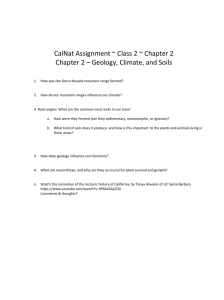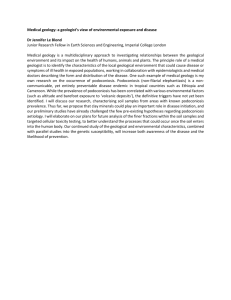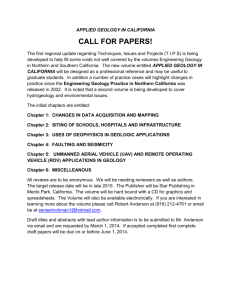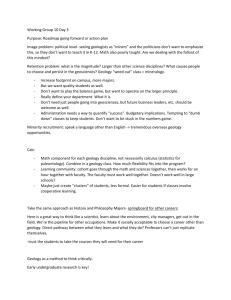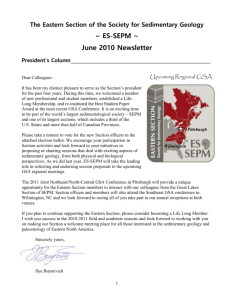Driese_one-page_cv_2015_AAAS_
advertisement
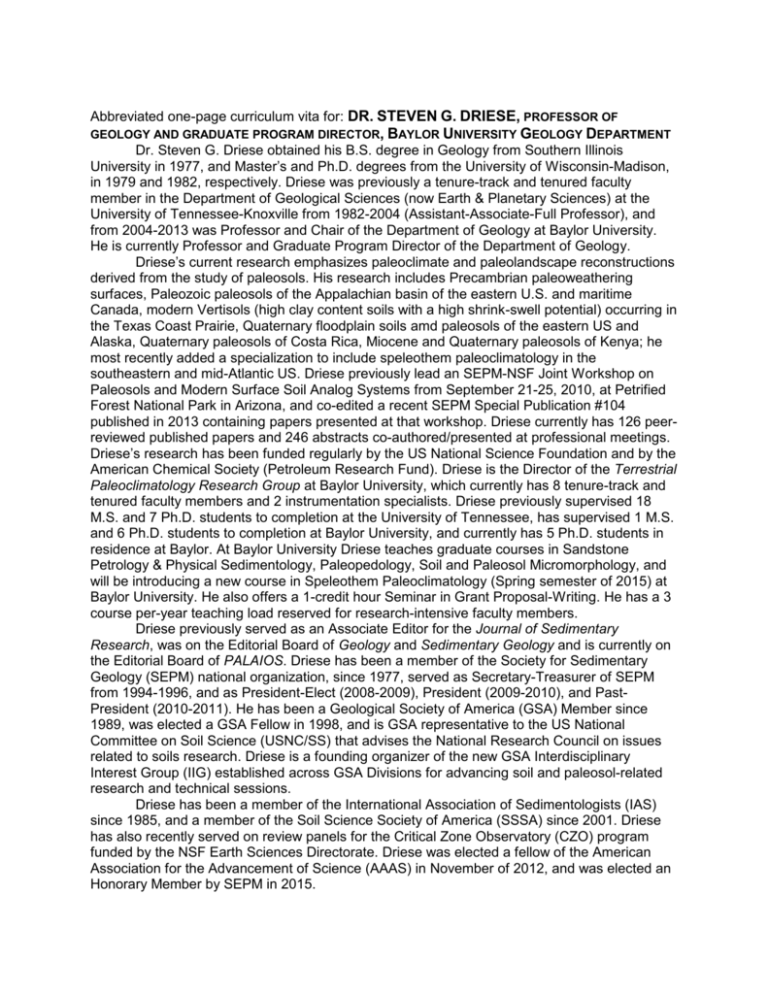
Abbreviated one-page curriculum vita for: DR. STEVEN G. DRIESE, PROFESSOR OF GEOLOGY AND GRADUATE PROGRAM DIRECTOR, BAYLOR UNIVERSITY GEOLOGY DEPARTMENT Dr. Steven G. Driese obtained his B.S. degree in Geology from Southern Illinois University in 1977, and Master’s and Ph.D. degrees from the University of Wisconsin-Madison, in 1979 and 1982, respectively. Driese was previously a tenure-track and tenured faculty member in the Department of Geological Sciences (now Earth & Planetary Sciences) at the University of Tennessee-Knoxville from 1982-2004 (Assistant-Associate-Full Professor), and from 2004-2013 was Professor and Chair of the Department of Geology at Baylor University. He is currently Professor and Graduate Program Director of the Department of Geology. Driese’s current research emphasizes paleoclimate and paleolandscape reconstructions derived from the study of paleosols. His research includes Precambrian paleoweathering surfaces, Paleozoic paleosols of the Appalachian basin of the eastern U.S. and maritime Canada, modern Vertisols (high clay content soils with a high shrink-swell potential) occurring in the Texas Coast Prairie, Quaternary floodplain soils amd paleosols of the eastern US and Alaska, Quaternary paleosols of Costa Rica, Miocene and Quaternary paleosols of Kenya; he most recently added a specialization to include speleothem paleoclimatology in the southeastern and mid-Atlantic US. Driese previously lead an SEPM-NSF Joint Workshop on Paleosols and Modern Surface Soil Analog Systems from September 21-25, 2010, at Petrified Forest National Park in Arizona, and co-edited a recent SEPM Special Publication #104 published in 2013 containing papers presented at that workshop. Driese currently has 126 peerreviewed published papers and 246 abstracts co-authored/presented at professional meetings. Driese’s research has been funded regularly by the US National Science Foundation and by the American Chemical Society (Petroleum Research Fund). Driese is the Director of the Terrestrial Paleoclimatology Research Group at Baylor University, which currently has 8 tenure-track and tenured faculty members and 2 instrumentation specialists. Driese previously supervised 18 M.S. and 7 Ph.D. students to completion at the University of Tennessee, has supervised 1 M.S. and 6 Ph.D. students to completion at Baylor University, and currently has 5 Ph.D. students in residence at Baylor. At Baylor University Driese teaches graduate courses in Sandstone Petrology & Physical Sedimentology, Paleopedology, Soil and Paleosol Micromorphology, and will be introducing a new course in Speleothem Paleoclimatology (Spring semester of 2015) at Baylor University. He also offers a 1-credit hour Seminar in Grant Proposal-Writing. He has a 3 course per-year teaching load reserved for research-intensive faculty members. Driese previously served as an Associate Editor for the Journal of Sedimentary Research, was on the Editorial Board of Geology and Sedimentary Geology and is currently on the Editorial Board of PALAIOS. Driese has been a member of the Society for Sedimentary Geology (SEPM) national organization, since 1977, served as Secretary-Treasurer of SEPM from 1994-1996, and as President-Elect (2008-2009), President (2009-2010), and PastPresident (2010-2011). He has been a Geological Society of America (GSA) Member since 1989, was elected a GSA Fellow in 1998, and is GSA representative to the US National Committee on Soil Science (USNC/SS) that advises the National Research Council on issues related to soils research. Driese is a founding organizer of the new GSA Interdisciplinary Interest Group (IIG) established across GSA Divisions for advancing soil and paleosol-related research and technical sessions. Driese has been a member of the International Association of Sedimentologists (IAS) since 1985, and a member of the Soil Science Society of America (SSSA) since 2001. Driese has also recently served on review panels for the Critical Zone Observatory (CZO) program funded by the NSF Earth Sciences Directorate. Driese was elected a fellow of the American Association for the Advancement of Science (AAAS) in November of 2012, and was elected an Honorary Member by SEPM in 2015.
